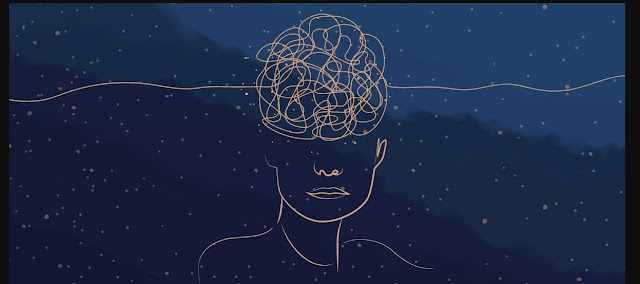You're struggling. We can tell. It's been hard to get out of
bed in the morning, harder to focus in class, and harder to make time for
anything other than your mental health. We want to help, but we don't know how.
That's where we come in. As a college student, you're not alone
in your struggles with mental health. In fact, one in five students struggles
with a mental health issue each year. Millions of students just like you are
finding ways to cope and get through the day-to-day.
In this article, we'll explore some of the most common mental health issues college students face and offer some coping mechanisms that have
helped us and others in the past.
What Are the Major Mental Health Issues?
There are a lot of mental health issues that people have to
deal with, and it can be tough trying to figure out how to cope with them. In
this section, we're going to take a look at some of the most common ones.
One of the most common mental health issues is anxiety. If
you're struggling with anxiety, it's important to find healthy ways to cope
with it. Some people find that exercise helps, while others find that
meditation or yoga works better for them. There are also a lot of great books
and podcasts out there that can help you learn how to manage your anxiety.
Another common mental health issue is depression. If you're
feeling depressed, it's important to reach out for help. There are a lot of
great resources out there, including therapy and medication. It's also
important to find healthy ways to cope with your depression, such as setting
realistic goals, hanging out with friends and family, and writing in a journal.
Recognizing Signs and Symptoms of Mental Health Issues
Mental health issues can be difficult to recognize in oneself,
and even more difficult to diagnose in someone else. This is because mental
health issues often manifest in subtle ways that are easy to ignore or write
off as normal behavior.
There are a number of signs and symptoms that may indicate that
someone is struggling with a mental health issue. Some common symptoms include
changes in mood, changes in eating habits, changes in sleep habits, difficulty
concentrating, isolating oneself from friends and family, and self-harming
behaviors.
If you are worried about yourself or a friend, it is important
to reach out for help. Talk to your doctor, or call a suicide hotline in your
area.
Depression & Anxiety: Symptoms & Treatment
Depression and anxiety can be extremely debilitating, making it
difficult to do everyday tasks. The good news is that there are many treatments
available, both medication and therapy-based.
There are many symptoms of depression and anxiety, which can
vary from person to person. Some of the most common symptoms are a feeling of
emptiness or sadness, racing thoughts, problems sleeping, changes in appetite,
and feelings of worthlessness or guilt.
If you think you might be experiencing depression or anxiety,
it's important to see a mental health professional. They will be able to
diagnose you and recommend a course of treatment.
Bipolar Disorder: Symptoms & Treatment
Bipolar disorder is a major mental health issue that can have
significant impacts on your day-to-day life if left untreated. It is
characterized by extreme swings in mood, ranging from depressive lows to manic
highs.
The most common symptoms of bipolar disorder include changes in
sleep patterns, reckless behavior, racing thoughts, feelings of worthlessness,
and difficulty focusing. Seeking professional help is the first line of defense
against bipolar disorder and there are a range of treatment options available
such as talk therapy, lifestyle changes and medication.
One way to proactively manage symptoms is to keep track of your
mood patterns over time so that you know what to look out for in the future.
Additionally, establishing consistent habits like eating healthy meals and
exercising regularly can help with regulating mood whereas hobbies like reading
or art can provide an effective outlet for managing emotions.
PTSD: Symptoms & Treatment
Do you have a friend who is dealing with Post Traumatic Stress
Disorder (PTSD)? It’s important to understand the symptoms and how best to
support them. Symptoms of PTSD can include flashbacks, feelings of guilt, fear
and anxiety, difficulty sleeping, avoiding reminders of similar traumatic
events, and depression.
If your friend is starting to experience these symptoms, it’s
important to get them help right away. Treatment for PTSD typically includes
cognitive behavioral therapy, exposure therapy, and medication if approved by
their doctor. It can also be helpful to practice healthy coping mechanisms with
your friend such as yoga and meditation to help reduce stress levels and
restore the body's natural balance. Additionally, encourage your friend to
engage in activities that bring them joy like outdoor activities or hobbies
like drawing or painting.
These activities can help build resilience in the face of
adversity allowing your friend to cope with the difficult emotions they are
experiencing.
Eating Disorders: Symptoms & Treatment
It is important to be aware of the signs of an eating disorder
and to take any necessary measures to address it. Eating disorders such as
bulimia nervous, anorexia nervous, binge eating disorder and others can have a
major effect on a person’s physical and mental health.
Common symptoms of eating disorders may include disturbed
eating patterns, extreme dieting, purging, excessive exercising and an abnormal
preoccupation with body image. If you think you or someone you know may be
exhibiting signs of an eating disorder, it is important to seek medical
attention. A doctor or mental health professional can help diagnose the
condition and provide treatment options that may include cognitive behavioral
therapy or medication.
Treating an eating disorder requires commitment from both the
patient and their family and friends. It is important to provide emotional
support while encouraging healthy behaviors as well as seeking professional
help when needed. Having a good support system in place can play a major role
in recovery. Eating disorders, such as anorexia, bulimia and binge eating, can
be extremely challenging to cope with. These disorders are highly stigmatized,
which makes it even harder for those suffering from them to reach out for help.
Treatment options for those with an eating disorder are
typically tailored to the individual and may involve counseling or
psychotherapy in order to address underlying issues. In some cases, medication
may be prescribed in order to help alleviate symptoms.
No matter what type of mental health issue you are dealing
with, it is important to know that there is help available and that you are not
alone. Don’t be afraid to reach out for support if you need it — your mental
health matters!
My coping story from depression
I'd like to share my story from dealing with depression. About
a year ago, I was feeling incredibly low and like I had no energy. It was hard
for me to get out of bed or even take a shower.
At first, I tried to ignore it and just power through, but it
didn't work. So then I started trying out different coping strategies that
worked for me.
The first thing that really helped was writing down how I was
feeling in a journal. Writing out my thoughts and emotions helped me to get
them out of my head and onto the page.
I also started doing yoga and meditation, which are great ways
to help bring your body into balance and reduce stress. Finally, I found an
online support group and talking with other people who were going through
similar things made me realize that I wasn't alone in this struggle.
These coping mechanisms have really helped me and this allowed
me to get back on track with life again!
When it comes to mental health, there is no one-size-fits-all
solution. What works for one person might not work for another, and that's
okay. The important thing is to find what works for you, and to keep exploring
until you find something that helps.
There are a lot of different coping mechanisms out there, and
it might take some time to find the ones that work best for you. Don't be
afraid to try different things, or to ask for help from your friends or family.
And if you ever feel like you're in over your head, don't hesitate to reach out
to a professional for help.
It can be hard to deal with mental health issues on your own.
However, there are many coping mechanisms that can help make the journey a bit
easier.
If you are struggling with a mental health issue, it is
important to seek help. There are many resources available, and there are
people who are willing to help. You are not alone.
.jpg)


Comments
Post a Comment